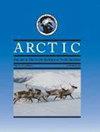Ideas with Histories: Traditional Knowledge Evolves
IF 0.8
4区 地球科学
Q4 ENVIRONMENTAL SCIENCES
引用次数: 0
Abstract
Anthropologists have long been fascinated by the strikingly similar adaptations of circumpolar cultures as well as their puzzling differences. These patterns of diversity have been mapped, studied, and interpreted from many perspectives and often at different social and spatiotemporal scales. While this work has generated vast archives of legacy data, it has also left behind a fragmented understanding of what underpins Arctic cultural diversity and change. We argue that it is time to engage with questions that highlight the roles of socio-environmental learning and cumulative cultural inheritance in shaping human adaptations to Arctic environs. We situate this in light of longue durée adaptations to environmental change. We examine five case studies that have used this framework to explore the genealogy of northern cultural traditions and show how social learning, cultural inheritance, and transmission processes are germane to understanding the generation and change in varied information systems (i.e., traditional knowledge). Specifically, a cultural evolutionary framework enables long-lens insights into human decision-making trajectories, with continued and prescient impacts in the rapidly changing Arctic. It is critical to improve understandings of traditional knowledge not as static cultural phenomena, but as dynamic lineages of information: ideas with histories. Improving knowledge of the dynamic and evolving character of inherited traditional knowledge in circumpolar human-environment interactions must be a research priority given the pressures of accelerating climate change on Indigenous communities and the social-ecological systems in which they exist in order to help buffer cultural systems against future adaptive challenges in the rapidly changing Arctic.思想与历史:传统知识的演变
长期以来,人类学家一直着迷于极地周围文化惊人相似的适应性,以及它们令人费解的差异。这些多样性的模式已经被绘制、研究和解释,从许多角度,往往在不同的社会和时空尺度。虽然这项工作产生了大量的遗留数据档案,但它也留下了对北极文化多样性和变化的基础的支离破碎的理解。我们认为,现在是时候探讨社会环境学习和累积文化遗产在塑造人类适应北极环境方面的作用了。我们把这一点置于长期适应环境变化的角度。我们考察了五个案例研究,这些案例研究使用了这一框架来探索北方文化传统的谱系,并展示了社会学习、文化继承和传播过程如何与理解不同信息系统(即传统知识)的生成和变化密切相关。具体来说,文化进化框架使人们能够从长远的角度洞察人类的决策轨迹,并在快速变化的北极地区产生持续和先见之明的影响。提高对传统知识的理解至关重要,传统知识不是静态的文化现象,而是动态的信息谱系:具有历史的思想。考虑到气候变化加速给土著社区和他们所处的社会生态系统带来的压力,提高对极地周围人类与环境相互作用中继承的传统知识的动态和演变特征的认识,必须成为研究的重点,以帮助缓冲文化系统应对未来快速变化的北极的适应性挑战。
本文章由计算机程序翻译,如有差异,请以英文原文为准。
求助全文
约1分钟内获得全文
求助全文
来源期刊

Arctic
地学-环境科学
CiteScore
2.30
自引率
0.00%
发文量
51
审稿时长
6-12 weeks
期刊介绍:
Arctic is a peer-reviewed, primary research journal that publishes the results of scientific research
from all areas of Arctic scholarship. Original scholarly papers in the physical, social, and biological
sciences, humanities, engineering, and technology are included, as are book reviews,
commentaries, letters to the editor, and profiles of significant people, places, or events of northern
interest
 求助内容:
求助内容: 应助结果提醒方式:
应助结果提醒方式:


